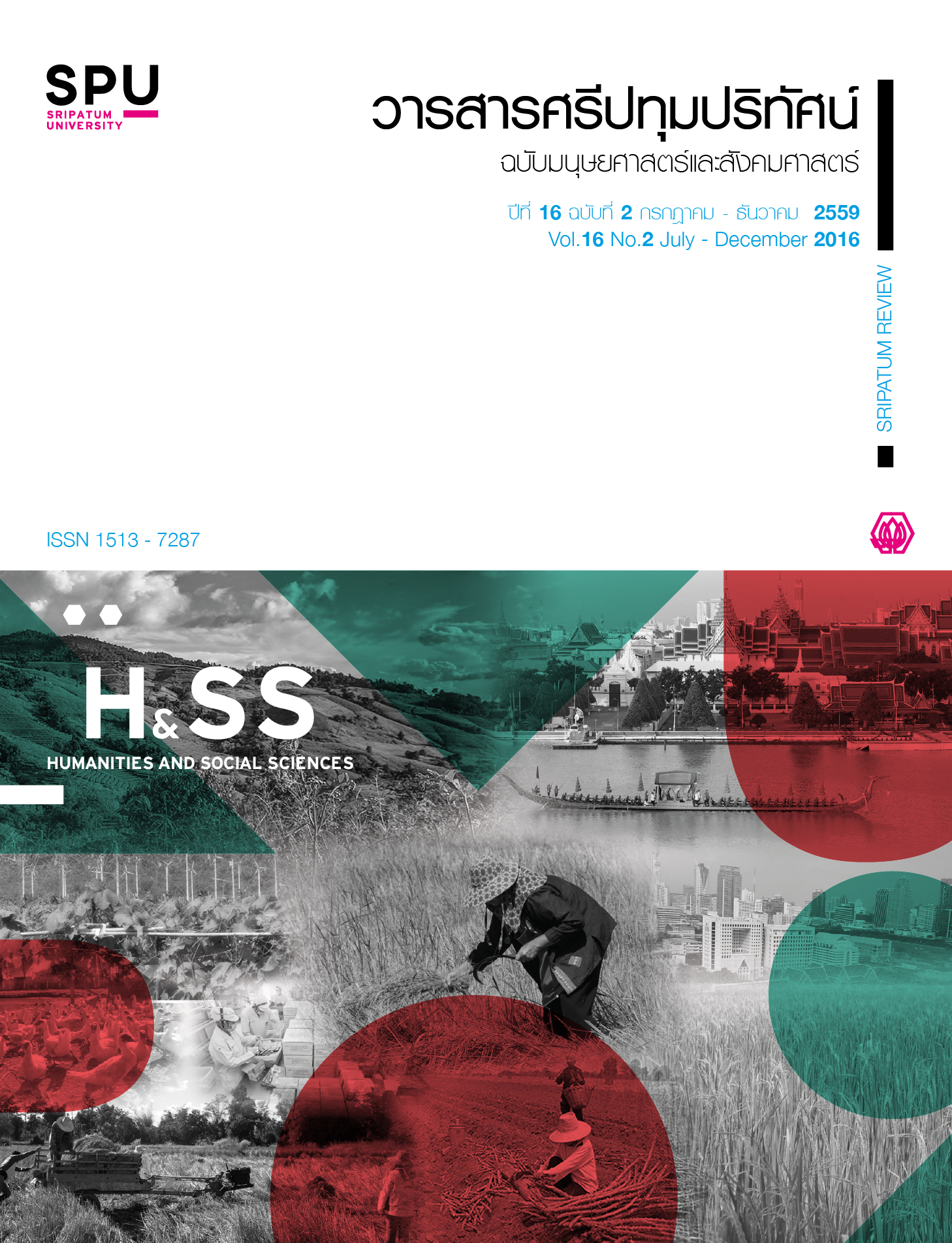THE DEVELOPMENT AND VALIDATION OF TEACHER’S EVALUATION LITERACY ASSESSMENT SCALE
Main Article Content
Abstract
This purposes of this research were to develop and validate the quality of the teacher’s evaluation literacy assessment scale. The research instrument was a 5-scale rating questionnaire. The research sample consisted of 50 in-service teachers at the secondary education level under the Office of the Basic Education Commission. The research results showed that the developed teacher’s evaluation literacy assessment scale was composted of seven components: (1) choosing assessment methods, (2) developing assessment methods, (3) administering, scoring and interpreting results of assessment, (4) using assessment results, (5) developing the grading procedure, (6) communicating the assessment results, and (7) recognizing the assessment ethics. The developed evaluation literacy assessment scale contained 48 items which had content validity ranging from 0.60 to 1.00. The reliability coefficient for each component ranged from 0.76 to 0.93, and the overall reliability coefficient was 0.95. The validation results of construct validity by confirmatory factor analysis method indicated that the model of teacher’s evaluation literacy conformed to the empirical data, with chi-square value = 12.85, df = 12, p-value = 0.38, TLI = 0.99, SRMR = 0.21, and RMSEA = 0.04.
Article Details
1. กองบรรณาธิการสงวนสิทธิ์ในการพิจารณาและตัดสินการตีพิมพ์บทความในวารสาร
2. บทความทุกเรื่องจะได้รับการตรวจสอบทางวิชาการโดยผู้ทรงคุณวุฒิ แต่ข้อความและเนื้อหาในบทความที่ตีพิมพ์เป็นความรับผิดชอบของผู้เขียนแต่เพียงผู้เดียว มิใช่ความคิดเห็นและความรับผิดชอบของมหาวิทยาลัยศรีปทุม
3. การคัดลอกอ้างอิงต้องดำเนินการตามการปฏิบัติในหมู่นักวิชาการโดยทั่วไป และสอดคล้องกับกฎหมายที่เกี่ยวข้อง
References
สุวิมล ว่องวาณิช และนงลักษณ์ วิรัชชัย. 2546. รายงานการประเมินการปฏิรูปเรียนรู้ระดับการศึกษาขั้นพื้นฐาน: พหุกรณีศึกษา. กรุงเทพ: สำนักงานเลขาธิการสภาการศึกษา.
สุวิมล ว่องวาณิช. 2556. “การพัฒนาครู”. ในสุวิมล ว่องวาณิช (บรรณาธิการ), การวิจัยและพัฒนากลยุทธ์การขับเคลื่อนนโยบายการศึกษาสู่การปฏิบัติ. (7-16) .พริกหวานกาฟฟิค.
สำนักงานส่งเสริมสังคมแห่งการเรียนรู้และคุณภาพชีวิตเยาวชน. 2557. กิจกรรมภายนอกชั้นเรียนที่กระทบต่อการจัดการเรียนการสอนของครู.
อมรวิชช์ นาครทรรพ. 2546. รายงานสภาวะการศึกษาไทยต่อประชาชนปี 2546: ผ่าปมปฏิรูป. พิมพ์ครั้งที่ 1. กรุงเทพฯ: หจก. ภาพพิมพ์.
Abell, S. K., & Siegel, M. A. 2011. “Assessment literacy: What science teachers need to know and be able to do”. In The professional knowledge base of science teaching (205-221).Springer Netherlands.
Alkharusi, H. 2011. “Teachers' classroom assessment skills: Influence of gender, subject area, grade level, teaching experience and in-service assessment training”. Journal of Turkish Science Education, 8(2).
DeLuca, C., & Klinger, D. A. 2010. “Assessment literacy development: Identifying gaps in teacher candidates’ learning”. Assessment in Education: Principles, Policy&Practice, 17(4), 419-438.
Earl, L. M. 2012. Assessment as learning: Using classroom assessment to maximize student learning. Corwin Press.
Edward, F. 2013. “Quality assessment by science teachers: Five focus areas”. Science Education International, 24(2), 212-226.
Eyla, L. 2013. “Digital Assessment Literacy-the Core Role of the Teacher in a Digital Environment”. Educational Technology& Society, 15(2), 37-49.
Jeong, H. 2013. “Defining assessment literacy: Is it different for language testers and non-languagetesters?”. Language Testing, 30(3), 345-362.
Leithwood, K., & Jantzi, D. 2008. Linking leadership to student learning: The contributions of leader efficacy.Educational administration quarterly.
Mertler, C. A. & Campbell ,C. 2005. “Measuring teacher’s knowledge & application of classroom assessment concept: Development of classroom assessment literacy inventory”. Retrieved July 31, 2014.
Mertler, C. A. 2005. “Secondary teachers’ assessment literacy: Does classroom experience make a difference? “American Secondary Education, 33(2), 76-92.
Mulford, B. 2008. The Leadership Challenge: Improving Learning in Schools. Camberwell, Victoria: Australian Council for Educational Research.
Nicol, D. J., & Macfarlane-Dick, D. 2006. “Formative assessment and self regulated learning: A model and seven principles of good feedback practice”. Studies in Higher Education, 31(2), 199-218.
Okonkwo, U. M. (2013). Examination of ODL In-service Trainee Teachers’ Assessment Literacy: Implication for Teacher Education in the Context of EFA and MDG. Retrieved 15 March, 2015.
Orr, M. T., & Orphanos, S. 2011. “How graduate-level preparation influences the effectiveness of school leaders: A comparison of the outcomes of exemplary and conventional leadership preparation programs for principals Educational”. Administration Quarterly, 47(1), 18-70.
Perry, M. L. 2013. Teacher and Principal Assessment Literacy. Retrieved 19 June, 2015.
Plake, B. S., Impara, J. C., & Fager, J. J. 1993.” Assessment competencies of teachers: A national survey”. Educational Measurement: Issues and Practice, 12(4), 10-12.
Popham, J. W. 2006. “Needed: A Dose of AssessmentLiteracy”. Educational Leadership, 63(6), 84-85.
Quilter, S. M., & Gallini, J. K. 2000. “Teachers’ assessment literacy and attitudes”. The Teacher Educator, 36(2), 115-131.
Scarino, A. 2013. “Language assessment literacy as self-awareness: Understanding the role of interpretation in assessment and in teacher learning”. Language Testing, 30(3), 309-327.
Siegel, M. A., & Wissehr, C. 2011. “Preparing for the plunge: Preservice teachers’ assessment literacy”. Journal of Science Teacher Education, 22(4), 371-391.
Stiggins, R., & Duke, D. 2008. Effective instructional leadership requires assessment leadership.
Phi Delta Kappan, 90(4), 285-291.
Volante, L., & Fazio, X. 2007 . “Exploring teachers’ candidate assessment literacy:Implication for teacher education reform and professional development”. Canadian Journal of Education, 30 (3), 749-770.
Wang, T. H., Wang, K. H., & Huang, S. C. 2008. “Designing a web-based assessment environment for improving pre-service teacher assessment literacy”. Computers & Education, 51(1), 448-462.
Webb, N, L. 2002. “Assessment literacy in a standards-based urban education setting”. A paper presented at the American Education Research Assosiation Annual Meetimg in New Orleans, Louisiana April 1-5.
Willis, J., Adie, L., & Klenowski, V. 2013. “Conceptualising teachers’ assessment literacies in an era of curriculum and assessment reform”. The Australian Educational Researcher, 40(2), 241-256.
Yamtim, V., & Wongwanich, S. 2014. “A study of classroom assessment literacy of primary school teachers”. Procedia-Social and Behavioral Sciences,116, 2998-3004.


